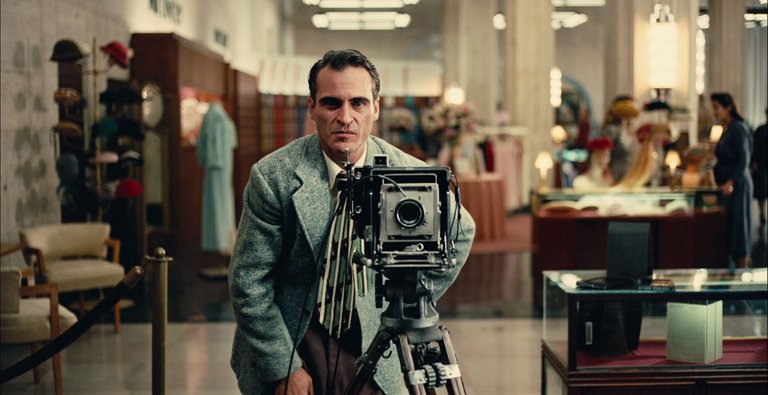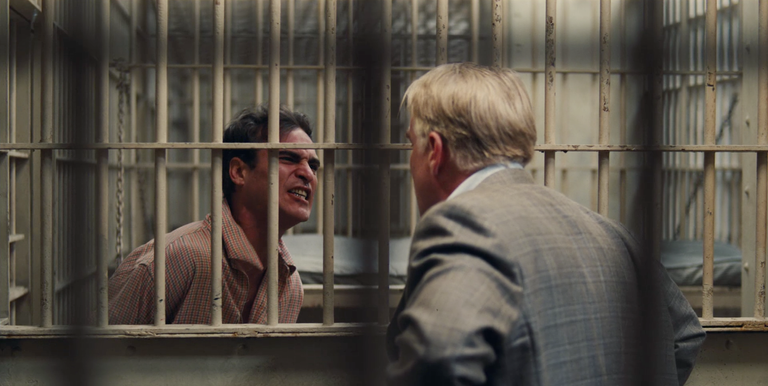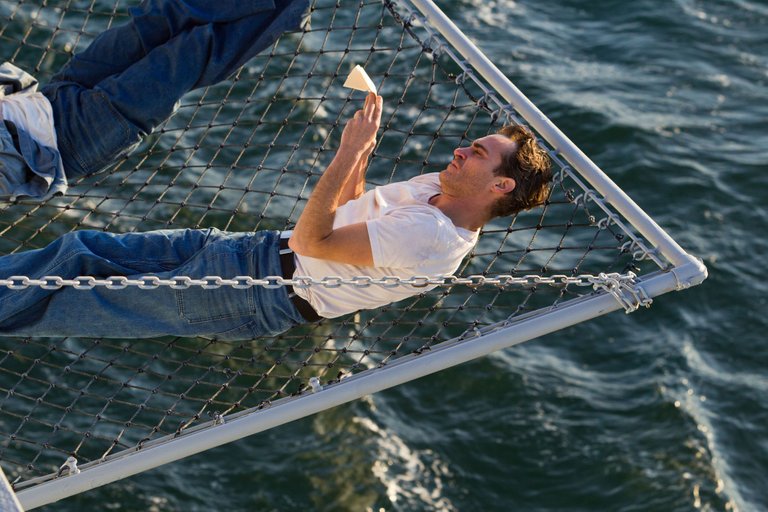
Source of the background picture
Plot
In The Master, Freddie (Joaquin Phoenix) is a World War II veteran who, after being given a number of opportunities for reintegration, struggles to find his place in the world. He has been entirely torn apart by the experience of war. His stormy path crosses with that of a highly charismatic man who claims to be the "master" of a kind of religious organization. This man is confident that his "methods," which are based on a mix of psychoanalysis, mysticism, and much exaltation, would allow him to assist his new companion. The views of his mentor are soon, nevertheless, called into doubt by Freddie, who finds himself once more facing the world alone.

Why you should watch it?
It's challenging to fully comprehend "The Master" the first time you see it.
Anderson isn't really interested in explaining; instead, he wants the viewer to feel the conflicted emotions Freddie is experiencing. Since The Master is a psychological investigation that goes deep, it does not employ the conventional instruments of mainstream cinema to accomplish its goals. And although it may seem to be running in circles, it is actually creating a climate that darkens more and more.
The pseudo-religious subject matter is utterly important in the movie. The only ways to break free from the social restrictions are to seek an identity that reverts to urges of an animalistic stage and to grin.

Source
And Freddie Quell is a clear example of this. The three things that define him are alcohol, sex, and the sea. While his fixation with alcohol makes him sick, his obsession for women, as evidenced by his real love for his fiancée Doris, is not always harmful. The sea and sexuality are border spheres in Greek mythology: Venus was created from a drop of Uranus' sperm that fell into the sea, a sea like the desert that Freddie travels through in search of Doris, a limitless sea in which, at the beginning of the movie, Freddie ejaculates after creating his Venus of sand, a symbol of a sexuality that can only be lived joyfully and freely by rejecting a leader who, however deeply loved, although assisting him, can only imprison him.

Source
The performances of a remarkable group of actors must take the lion's share in a film that is almost a psychoanalytical analysis of its protagonists and the relationships between them: if Amy Adams is perfect in utilizing the brief but significant space at her disposal, the two protagonists, and in particular their powerful and impressive duets, are the heart of the entire movie. In this role, Philip Seymour Hoffman provides one of his best performances; his Lancaster Dodd is a nuanced character who understands how to captivate the audience with his charisma while also alienating him with sudden outbursts of rage and a creeping discomfort;
When it comes to providing a deeply physical and animal interpretation, Joaquin Phoenix just outdoes himself. It even starts to make us think of the best De Niro, and it's not without complexity and intrigue too.
And the praises should go also to the director because he creates a movie with images of exceptional beauty and power and also thanks to the excellent work of the entire technical team, particularly Mihai Malaimare Jr.'s photography, which is even better in the impressive 70mm version and helps to make the American 1950s seem authentic.

Source

Conclusion
The Master is thus unquestionably a "great" film in more than one sense; It is grandiose without being repetitious, has clear and intellectual writing, and features intense performances. it is intricate and rarefied. Of course it has its flows since during the roughly two and a half hours of viewing, there is a clear disparity between the meticulous care taken with the filming and the series of protracted (someone may even say somniferous) discussions that, with time, tend to get a little bit confusing.

Rating
My personal vote is:
8.0/10

Farewell image and text separators, created by me with Canva
